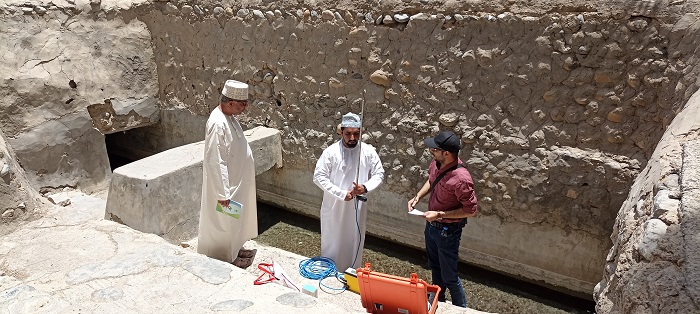
Muscat: For a research project the role of falaj water management systems in shaping social cohesion and economic sustainability within Omani tribal communities is being studied, according to Dr. Majid Labbaf Khaneiki, Assistant Professor and UNESCO Chair on Aflaj Studies and Archaeo- Hydrology at the University of Nizwa.
The project, “Aflaj Systems and Social Cohesion in Oman, Dakhiliyah Region”, is a pioneering research project funded by the block funding programme of the Ministry of Higher Education, Research and Innovation.
While many Western anthropologists have portrayed tribal societies as territorially insular and resistant to external influences, the findings of this study challenge this notion.
The aflaj system instead emerges as a central organising principle that transcends tribal boundaries, fostering cooperation and economic interdependence.
For the methodology, Dr. Majid Labbaf Khaneiki and his team employed an inductive qualitative approach, drawing on archival research and ethnographic fieldwork in northern Oman.
They conducted in-depth interviews with local aflaj stakeholders, complemented by an extensive literature review using both hard copy and online sources.
The findings of the study reveal that the aflaj irrigation system in the Sultanate of Oman functions more than a method of water distribution—it serves as a foundation for what the researchers’ term “hydro-tribalism,” a social structure where intertribal cooperation is driven by the technical and geographic demands of shared water resources.
Contrary to western anthropological depictions of tribalism as territorially rigid and insular, the falaj system promotes collaboration across tribal lines, compelling communities to adapt spatially and socially to the hydrological realities of water’s mobility.
This dynamic reframes the aflaj as a central organising force that tempers territorial disputes and facilitates shared governance.
Moreover, the research highlights how the aflaj system underpins a broader hydro-economic network that transcends tribal divisions through collective investment, standardised agricultural practices, and trade enabled by waqf-supported infrastructure.
This interdependence has historically fostered social cohesion and economic sustainability.
However, the system now faces existential threats from urbanisation and environmental degradation.
Preserving the aflaj is critical not only for water management, but also for safeguarding the social and economic fabric it sustains, offering a valuable model for resilience and sustainable development in an era of climate and societal pressures.
Through this study, Dr. Majid Labbaf Khaneiki recommends safeguarding afalaj systems not only as a water supply source, but also as a social asset that has enabled Omanis to live in perfect harmony with both others and nature.
The lessons embedded in the aflaj system offer invaluable insights into sustainable development, demonstrating how cooperation can prevail over territorialism in shaping resilient societies.
This research project was published in the Journal of Arabian Studies and GeoJournal.
The research team consisted of Dr. Majid Labbaf Khaneiki, Dr. Abdullah Al Ghafri, Amjad Al Rawahi, Dr Khalifa Al Kindi, Dr. Nasser Al Saadi, Ms. Zahra Al Abri, and Ishaq Al Shabibi.